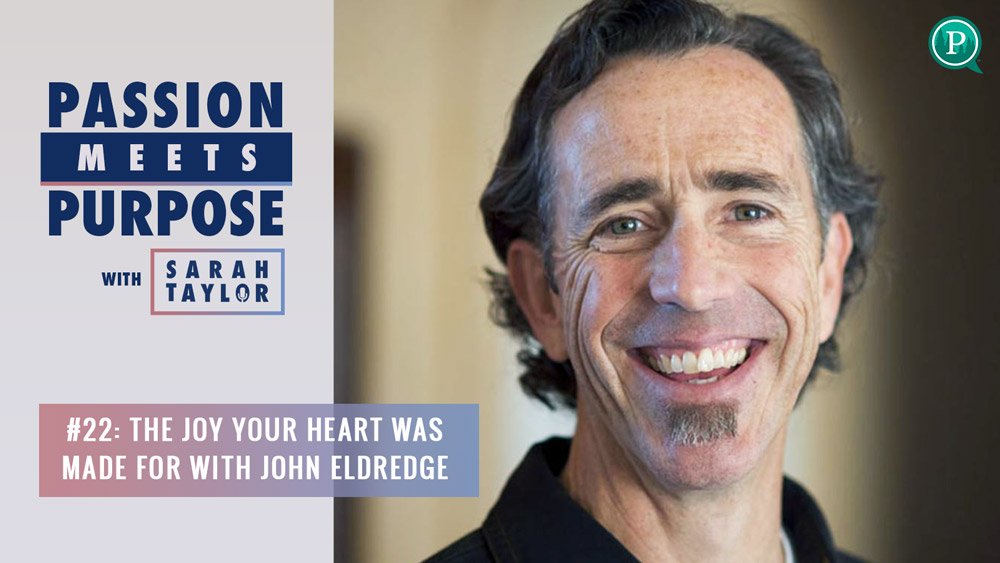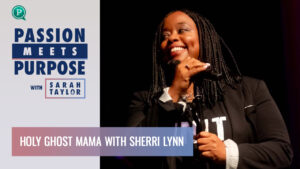New York times bestselling author, John Eldredge join the Passion Meets Purpose Podcast today. You probably have a couple of his books on your shelf or your Kindle. Today we’re soaking in the trilogy of Christian life; the privilege of an intimate relationship with God, the concept of living in the “not yet,” and having a battle plan. The great hope of Christianity is what is to come and John digs into what that really means and how this is what sets Christianity apart.
Interview Links:
Follow John Online | Facebook | Twitter | Instagram
Books:
- The Sacred Romance
- Journey of Desire
- Waking the Dead
- Moving Mountains, Praying with Passion, Confidence, and Authority
Transcription:
John Eldredge: Christianity’s A-game is not parenting. It’s not time management. It’s not, you know healthier ways to eat. Christianity’s A-game is there is a coming kingdom. Your heart is made for the joy of it. And when you know that to be true, it just changes your ability to navigate this life.
Sarah Taylor: That is New York times bestselling author, John Eldredge.You probably have a couple of his books on your shelf or your Kindle. I know that my first introduction with him was my mom. After having read the book wild at heart, she had everything underlined. She said helped her so much understand my stepdad better understand raising my brother, Andrew. So like being married, having a son, just anything about the heart of a man. And so I always remembered author John Eldredge, and then he has so many more books that we’re going to discuss quite a few of them. So, let’s begin.
Introductory questions actually come from a good friend of mine. Who’s a counselor and her name is Caroline and your books line her shelves. And so I asked her, what would you ask John Eldredge? So this is from Caroline. She said that your first three books, The Sacred Romance, Journey of Desire, and Waking the Dead, are described as sort of a trilogy for the Christian life.
She goes on to explain like The Sacred Romance about coming into that intimate relationship that we’re privileged to have with God. And then the Journey of Desire is the reality of living in the not yet, the place of loss and grief. And then finally Waking the Dead. You lay out the battle plan. Is there any different way that you would describe or add to those descriptions of the first three books?
John Eldredge: That is really well done. And it’s fun to hear it put so succinctly. I think another way of talking about them is I found myself wondering where is this life that the new Testament in particular just seems to shout is available to us, this intimacy with God, this life of joy, this connection, this purpose, and frankly, the victory.
And so, yeah, sacred romance is a book that really gives us a whole new way of understanding life as romance with God. And I mean that in a broad sense of all the ways that he speaks to our hearts, through music, through nature, through the things we love. And, and journey of desire is can really be summarized in one idea that the way you handle your heart’s desire really reveals what you think of God. Is he trustworthy? Is he good? Does he care and invites us to wrestle with those in an honest way? And waking the dead, my friends have also described it as a strong cup of coffee. It’s a little bit of a wakeup call to the fact that we live in a world at war. You have an enemy hates your gut and yet you don’t have to live under his accusations. You don’t have to live under his mocking and the way that he constantly tries to reinterpret the events of your life to either accuse you or accuse God. So, life joy, hope, that’s kind of the trajectory of those books.
Sarah Taylor: Another one of Caroline’s questions is she says, she talks about how you went through a dark time after your good friend Brent died. And although you alluded to it, the journey of desire seems to be the conclusions that you came to through that dark time. So, can you talk a bit more about actually being in that dark place?
John Eldredge: The only thing that’s more tragic, and the tragedy that happens to any of us, is what we choose to do with it, because what we choose to do with it typically is not to care for our souls. And in the journey of desire, I describe the journey with loss, with grief and, but also into the thing that was exposed in me so quickly, was that I don’t really think much about Heaven, I don’t really think much about eternity. It really exposed that I have placed all of my hopes on this life. And the fact of the matter is if you do that, it will break your heart. Life will break your heart. And if your hopes are set here only, or even primarily, we’re that we’re missing out on the hope of the gospel. Christianity’s A-game is not parenting. It’s not time management. It’s not, you know, healthier ways to eat. Christianity’s A-game is there is a coming Kingdom. Your heart is made for the joy of it. And when you know that to be true, it just changes your ability to navigate this life.
Sarah Taylor: That’s just such a relief to hear. We don’t hear that enough. I hear a lot about the parenting and the finances and the eating better. And yes, we can all understand how those things are good and important. We’re not, you and I are not arguing that, but why does it feel like such a relief that that’s not the number one priority?
John Eldredge: I think that the church has really gotten pushed into playing that other game because we live in such a massive age now of unbelief, that to try and talk to people about the kingdom of God, about the hope of the coming kingdom, it just feels so out there. That instead, it almost feels like we’ve got to put our A-game and by that I just mean it’s our primary treasure. It’s like the great hope of the gospels. And we set that aside and then try and find something else that makes Christianity look more relevant, particularly justice in our day. And I, you know, I support justice causes and I give financially to them, but when we lose the hope of the coming kingdom, we really lose Christianity. And it becomes something else. It kind of becomes like the peace Corps with music.
Sarah Taylor: You write in Journey of Desire, page 181, you say, quote, there’s a widespread belief in the church that to be a Christian somehow satisfies our every desire. As one camp song has it I’m in right outright, upright downright, happy all day long. And then you say what complete nonsense. Let’s talk about that.
John Eldredge: So there’s actually two kind of camps. Now, there’s there’s the camp that says you can experience victory, joy, fullness, overcoming, you know, whatever the right word is, all the time. That life in Jesus, once you kind of get that dialed in is only good. It’s only trial, it’s only overcoming. And, and then there’s this other camp, which would kind of be sort of what we would call the authenticity movement now in Christianity. And it’s it, and there’s a lot of talk now about the ache and the journey, and a lot of talk about my brokenness and my struggles. There’s a lot of songs about that now. And it almost feels like you have to choose between the two. Either there’s this promise of always breakthrough or frankly, there really isn’t breakthrough and neither are true.
Neither of the gospels. There’s incredible joy. There’s incredible hope. There actually is more healing and restoration than most people believe is available through life in God. Like I’m, I’m a counselor. I do healing prayer. I see it all the time. People get better. But the problem is, is that if you claim unending breakthrough, you lose all of those passages on what it means to share on the sufferings of Christ. You know, that’s not a popular Gospel. I mean, who wants to, Hey, come and share the sufferings of Jesus. That doesn’t market well. But what makes me equally sad though, is that there, there is this authenticity movement and sermons and books, and it tends to be, you know, in the millennial generation in particular, And I love the authenticity.
I love it. What I want to say to them is, and you know, don’t just stay in your brokenness, like is restoration. He restores my soul as the Psalm say. There, if what we’re talking about is we’re talking about learning to live with the partial, right? Yeah.
Sarah Taylor: How do you hold the tension between those two?
John Eldredge: By grace. Only by love. Right? I mean, only with the help of an intimate relationship with Jesus. I mean that, like, that’s it. The core of what we’re talking about is this, that if you can find a, an intimate relationship with Jesus, it will bring you joy. And it will also sustain you through some pretty hard things. Cause he doesn’t take all the hard away.
Sarah Taylor: I think it’s so important that that message is heard, especially among our radio audience, as you know, so much of what we do on the station is uplifting and encouraging. We need to be able to talk about the other side as well.
John Eldredge: The lover isn’t it because of course you want to be positive. Hey, come listen to our downer station… Gonna pop your bubble. That’s not helpful either. We do need to understand the honest of the scriptures. I mean, the scriptures are staggeringly, honest book, and you just read through the Psalms. There is joy, there is trials, there is also heartache. And if, if we can be honest with the heartache and show people how to find their way toward wholeness, I think we’ll be giving them a much truer experience of the gospel. Right. And maybe a different word is permission. You have permission to be exactly where you are. You have permission. You don’t have to feel anything other than what you’re feeling today. And if it’s joy, be joyous. And if it’s grief, we get it. We understand you have permission. And with permission as an invitation. There, there is a life, an inner life. It starts, it’s an inner life. Ephesians three, that Christ may dwell in your heart. There’s an inner life with God that brings joy and playfulness and romance and can sustain you through the really hard things. That’s the remarkable offer.
Sarah Taylor: One of the ways that we access that relationship that you’re describing is through prayer, which is an excellent transition to your book, which is called Moving Mountains, Praying with Passion, Confidence, and Authority. So why don’t we why don’t we jump in with someone who goes confidence? Passion? Authority? That’s not how I pray. How do I get there?
John Eldredge: I think the number one mistake people have made when it comes to prayer, Is that we conceive a prayer is simply asking God to do something and then waiting to see whether or not he does it. Right. It’s simple as that, you know, and it tends to be about a 20 second transaction. You know? We, we pray, we, we voice our request, our plea, our, you know, our supplication. We give it some words and then that’s it. And then we wait, and over the next couple of days and see if anything happens. It’s a very disheartening approach to prayer because I think a lot of people have found that, you know, that doesn’t work and they’ve come to the terrible conclusion that, you know, prayer doesn’t work, when kind of a big sort of light bulb moment for me was coming to realize that prayer is something that you learn, just as you learn to play an instrument or ride a bike, right? But read a book or any of the things that you enjoy in life, tennis, skiing, rock climbing, you know, good conversation. You learned how to do that. And prayer is no different. It’s actually a very rich world of spiritual life that the scriptures invite us into and give us a tutorial in if, if we’re willing to learn.
Sarah Taylor: When I got a copy of the book, I jumped straight to chapter 12, which is on listening prayer, because I’m always so curious as to how different people claim to hear from God. I mean, we’ve all heard stories of how, you know, someone will say, well, I prayed about this and the Lord said blank.
John Eldredge: Well, first, like those stories can be so infuriating if it is not your experience to feel like God is communicating with you in any sort of clarity. Those can be really infuriating stories. I acknowledged that. I, there’s two things to begin with. The scriptures are filled with stories of God speaking to his people, both old and New Testament. Both pre cross and resurrection, in post cross and resurrection. I mean, even his latest, the book of revelation where Jesus is writing to the church and he says, I stand at the door and knock if anyone hears my voice and lets me in, I’ll come in and we’ll be intimate. It is actually the offer. It is the offer. Now I want to quickly say I understand that many people have not been instructed in it. And so it can be frustrating. So listening prayer first off is not audible. The, the spirit of God dwells in you. You are now, if you’ve opened your life to Jesus, you are now where he dwells, right? It’s shifted from the temple into the human person. So you’re listening for an internal guidance and internal voice.
And the mistake that most people make when trying to approach listening prayer is that they start massive drama with huge questions. You know, do I have cancer? You know, should I quit my job tomorrow? To, you know, do you want our family to move to the Philippines? Like those are way too big. You can’t, you don’t learn to ski by doing double black diamond.
You don’t learn listening prayer. That’s very cruel listening practice and very, very simple steps to it that will help immensely. The first one, you do have to get quiet. And in our world, that alone is going to do you so much good. Even if you don’t hear a thing. Like learning to get quiet. I mean, stillness. I mean, close the door. You know, I find some place, take a walk, whatever it takes to quiet down your internal world, because there’s so much chatter and there’s so much noise. Of course, you can’t. So, step one, you kept quiet.
Step two, you ask a very simple question, right? You don’t start with high drama. You don’t start with tension, stress, pressure, or I have to hear from God. You know that that never helps. And that it’s like, it’s like lying down to get a good night’s sleep. And you say to yourself, I have to sleep tonight. You know, it’s going to backfire. You get quiet. You get still on. The second step is ask a very simple question and, and you linger there.
And, and the third thing that’s just immensely practical is we learn surrender. If we’re not open to hearing. Yes or no. Can I buy the motorcycle? Well, if you’re not open to hearing No, you’re never going to be able to trust that you heard yes, right? It’s this beautiful thing of surrender. It’s this thing of no Jesus, I really actually am open to what you have to say.
Sarah Taylor: And I know that you apply this, you speak in the book about how you apply this concept when you’re praying for others, rather than just instantly jumping in and starting to pray for your agenda over that person. Like who among us, wouldn’t go to a friend who was sick and instantly start praying healing over their life, or restoration over their marriage. And yet in the book you describe a little of some of the ways that you first bring yourself under the authority of God in his kingdom and then aligning yourself with God’s will so that you’re praying in a way that you describe as actually bringing more strength to your prayers, because you’re praying in accordance with the way that the holy spirit is guiding you.
John Eldredge: So the big idea is this, the big idea is that prayer is partnership with God. So in the old Testament, when Elijah ends the three-year drought by praying, he does so because God told him to. God said I’m going to end the drought, and then the fascinating thing is he doesn’t just end the drought, he says, I want you to pray. So, God’s working and Elijah’s working. We’re partners. It’s so thrilling. This is going to really be fun. We are partners with God in prayer. It’s not just asking him to do things. And then in the New Testament, you see the story of Ananias, when he sent to restore Saul’s sight, Saul has been blinded on the road to Damascus. And he is now in Damascus and Jesus goes to his friend, Ananias, and he says, I want you to go pray for Saul. I’m going to restore his sight. And it’s just fascinating because Jesus could restore his sight, but he chooses to use Ananias in the process.
We’re his partner. And so, a couple of days ago, I knew my son was having a really hard time at work. And I wanted to just jump right in and start playing, you know, praying for work and praying for his boss to be nicer to him. And, you know, I just paused, and I just said, Jesus, what does he need? What, what, rather than just, you know, because it feels like swinging at a pinata most of the time, right? You’re just, you don’t, he just, there’s not like a subtleness in those prayers. I just paused, quieted myself, took my agenda out of the picture for a moment and just said, Jesus, what is my son need? For very, very kind of, I, you know, it’s not audible words. I just had the sense of, he needs to be reminded how loved he is. Like my love was kind of the idea I had, but the love of God. And so instead of praying for work, I suddenly found myself praying the love of God over him. Now that may have been accurate or inaccurate, but I’m telling you something, you started praying the love of God over somebody, they’re going to have a good day.
Sarah Taylor: Well, John, we’re coming up on the close of our time together. Is there anything I didn’t ask, but you’d still like to address?
John Eldredge: Here’s another really very practical help with the idea of prayer. It depends on where you are looking. When we’re praying, we’re typically looking at the crisis. You know, we’re, we’re looking at the checkbook, you know, we’re looking at the, you know, the sick person in front of us, or we’re looking at the coming disaster at work. You know, we’re looking at the crisis and it does not help your faith, and it doesn’t really help your prayers. What we’re encouraged to do is don’t look at the problem that you’re praying over, look at God. And by that, I mean, looking at anything that reminds you of God. Like, I love to look at pictures of the ocean. I just love it. It’s so big and beautiful and rich and powerful. I go, oh, right. Like you, you have plenty of resources for what I’m about to pray about. So just that simple idea of turning your gaze, turning your gaze back in his direction, will just bring it, just a different feel to your prayer life.
Sarah Taylor: I love that. And it works very well for the Pacific Northwest because we have a lot of water and a lot of mountains. And so whenever you invoke nature, anyone in here in the Seattle Metro area is able, I mean, all you have to do is look up to Mount Rainier.
John Eldredge: Exactly.
Sarah Taylor: Well, thank you so much for your time. I really appreciate it.
John Eldredge: Oh, me too. Delightful to chat with you.
Sarah Taylor: John Eldridge, New York times bestselling author. You heard a whole host of books there that you could go and see if you need to start with your first one. Our thanks to Rebecca Beckett, our content coordinator, Scott Karow, our wonderful producer and editor, and my thanks to you for listening. I’ll see you in two weeks.
Follow this podcast:







